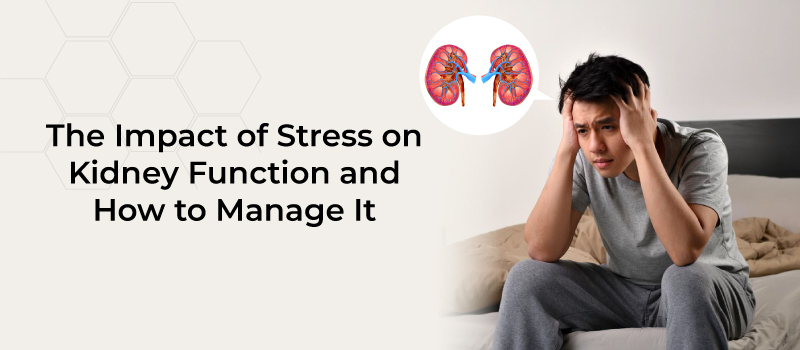The Impact of Stress on Kidney Function and How to Manage It
Asian Institute of Nephrology and Urology | September 5, 2023

Table Of Contents
Stress is part of life. However, excessive stress can contribute to poor health, increase our blood pressure, and even damage the kidneys. The prevalence of Chronic Kidney Disease (CKD) has proliferated in the past two decades. The rising rate of CKD has been attributed to comorbidities such as Diabetes, Hypertension, and obesity. But recent research has begun to acknowledge and explore the implications of social, economic, and psychological factors on CKD. In this blog, we will explore the impact of stress on kidney function and gauge ways to manage it.
The Relationship between Stress and Kidney
Simply put, stress is anything that upsets or disrupts a person’s usual equilibrium or balance. Stress can be physiological or psychological. Living with chronic illnesses, such as kidney diseases, can be a significant source of stress. It is noteworthy to mention that stress is not an all-evil phenomenon, as it can help manage immediate dangers or crises. In addition, stress can also serve as a positive motivator while navigating life’s challenges when channeled properly.
However, when the human body is under intense levels of stress for sustained periods of time, there are physical reactions that can eventually harm the body's health if left untreated. The combined effects of stress, which include an increase in blood pressure, a faster heart rate, and higher fat and sugar levels in the blood, can contribute to kidney problems, cardiovascular diseases, etc.
A lot of people are surprised to learn that stress and kidney damage are interrelated. As the blood filtering units of the human body, the kidneys are more susceptible to problems pertaining to blood circulation and blood vessels. Stress hormones like adrenaline can worsen Hypertension. High blood pressure and high blood sugar can place an additional pressure on kidneys. Individuals with high blood pressure and diabetes are at greater risk for kidney diseases. So, if you already have kidney problems, you are more prone to blood vessel issues and problems related to the heart.
Likewise, if you have heart disease or kidney problems, then the body’s reaction to stress can become more dramatic and dangerous. Thus, whether your aim is to curb heart or kidney diseases or bolster your overall health while living with kidney or heart problems, managing stress must be your priority.
Effect of Stress on Kidney Function
The effects of chronic stress on kidney function include:
- High blood pressure
- Increased heart rate
- Increased stress hormones
- More blood sugar levels
Recognizing Signs of Stress-Related Kidney Diseasesy
The key is to recognize signs of stress-related kidney diseases in a preemptive fashion so that you can take the right steps. Some of the symptoms include:
- Change in urination
- Fatigue
- Sensation of one's own heart heartbeat - Palpitations
- Swelling in your hands, legs, or feet
- Shortness of breath
- Pain in the back
- Lowered appetite
- Puffiness around the eyes
- Abnormal levels of phosphorus, calcium, or vitamin D
- High Blood Pressure
Strategies for Managing Stress to Support Kidney Health
It is incredibly challenging to reduce stress, but it is not a losing battle, as there are many fool proof ways to mitigate stress. The key is to remember that stress mitigation is a long-term journey, not a short-term end goal. Some simple ways to reduce stress include:
- Eating healthier food
- Setting aside time to relax
- Limiting sugar and caffeine intake
- Trying yoga and meditation
- Regularly exercising
- Getting proper sleep
- Regularly exercising
- Following proper schedule for sleep and food
Seeking Professional Help and Support
Whether it is stress, chronic kidney disease, or an enmeshing of the two, timely intervention is imperative in today’s day and age. By opting for the right kidney specialist and mental health specialist and ensuring that they work in tandem, you can take good care of both your psychological issues and your tangible kidney problems.
Conclusion
So, there we have it—an overview of the relationship between stress and kidney-related diseases.
FAQs
1. Can stress really affect my kidney health?
Yes, stress and uncontrolled reactions to stress can deteriorate your kidney health.
2. What are the common symptoms of stress-related kidney issues?
The most common symptoms of stress-related kidney issues are fatigue, nausea, vomiting, cramps, frequent peeing, dry or itchy skin, and more.
3. How can I reduce stress to protect my kidney health?
Simple steps like regular physical activity, proper sleep, eating good food, etc. can reduce stress and protect kidney health.
4. Are there specific relaxation techniques that can help alleviate stress's impact on the kidneys?
Deep breathing, meditation, and mindfulness are special techniques that can mitigate stress’s impact on your kidneys.
5. When should I seek medical advice for stress-related kidney concerns?
When you experience symptoms such as being unable to concentrate, chronic fatigue, frequent trips to the loo, and more, then it might be time to seek medical advice for stress-induced kidney concerns.







